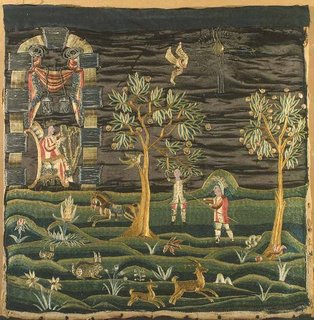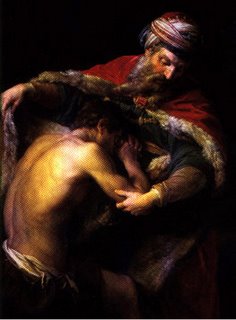Two Fathers; Two Sons
 One the the lectionary reading for this week is 2 Samuel 18, which is a recounting of the death of David's son Absalom. The devotional reading in Disciplines compares this story to the New Testament parable of the Prodigal son (Luke 18:11-32). I had never seen any parallel between the two, but, now that someone has pointed it out to me, I do.
One the the lectionary reading for this week is 2 Samuel 18, which is a recounting of the death of David's son Absalom. The devotional reading in Disciplines compares this story to the New Testament parable of the Prodigal son (Luke 18:11-32). I had never seen any parallel between the two, but, now that someone has pointed it out to me, I do.First, a little background on Absalom. He was David's son. His sister, Tamar, had been raped by their half-brother, Amnon (David's oldest son). Two years later, Absalom has Amnon killed. Many years later, he leads a revolt against his father, beginning in Hebron, and proceeding to Jerusalem. David flees the capital. The two armies meet in the wood of Ephriam. David's army wins the battle. Against David's wishes, Joab kills Absalom when the son gets caught in an oak tree by his hair. Messengers return to David and tell him of the victory as well as the death of his son. I was very struck by David's reaction, which is the reaction of a father, not of a king. "The king was shaken. He went up to the room over the gateway and wept. As he went, he said: "O my son Absalom! My son, my son Absalom! If only I had died instead of you—O Absalom, my son, my son!" (18:33) He is heart-broken.
What I want to do is to compare the two stories -- Absalom and the Prodigal son.
- Prodigal translates as extravagant. Think of Absalom -- son of David, Prince
 of Israel. He had to be a man who was used to extravagance. I'm not sure that anything would stop him from taking what he wanted. I have a feeling that the prodigal son also was used to extravagance -- his father was not a poor man -- he had an estate, and was able to divide it to give an inheritance to his son.
of Israel. He had to be a man who was used to extravagance. I'm not sure that anything would stop him from taking what he wanted. I have a feeling that the prodigal son also was used to extravagance -- his father was not a poor man -- he had an estate, and was able to divide it to give an inheritance to his son. - I wonder if jealously plays a part in the stories. Joe brought up the idea last week in church that one of the consequences of David's sin with Bathsheba was the actions of his sons as they grow older. I wonder if Absalom's attempt to steal the thrown was a reaction to David's favoritism toward Solomon, the man who would become king, and who was Bathsheba's son. Think also of the older brother in the Prodigal son story -- jealous of the return of his younger brother and the reaction of their father. Jealousy doesn't play the same role in the two stories, but it is present.
- Absalom, by rebelling against his father, is, in fact, stating that he wished his father were dead, so that he could be king. He takes action to make this wish become fact. The prodigal son, by demanding his portion of the inheritance, is also saying that he wished his father were dead.
- Neither son makes wise decisions with that with which they have been blessed (could there be a more awkward phrase?).
- Both fathers -- to their own possible detriment -- continue to hope for a reunion with their sons. In the heat of battle, when David's priority as king is regaining his thrown, David insists that his son be treated gently. This could have cost him his kingdom, but he willingly takes this gamble. When the prodigal son is returning home to become a farm hand, the father throws a huge party, and risks his relationship with his elder, loyal son to reinstate the younger son. Both stories are, in some part, stories of extravagant love -- prodigal love. Both are stories of undeserving love.
Prior to Christ, we would have been the son hanging on the tree. Now he is.
Images: Absolom by Robinson Trumbull. Return of the Prodigal Son by Pompeo Batoni

3 Comments:
The parable of the lost son leaves us hanging. There's reinstatement, forgiveness, joy, reconciliation between the father and the FOUND son...but what about the older brother?
I heard a sermon about this parable once that reminded us that Jesus didn't name the parable. We call it the parable of the lost son or the parable of the prodigal son...I bet most people think "prodigal" means "lost." When we name it, we limit it...
What do we do about the older brother?
What DO we do about the older brother? Especially since, so often, we ARE the older brother?
Oooh, Batoni is good! I oughta artblog him.
Post a Comment
<< Home